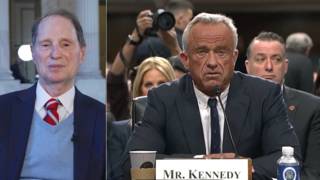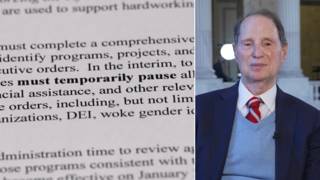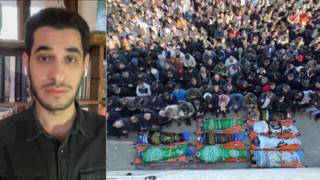
Related
Topics
On International Women’s Day, Guardian reporter Suzanne Goldenberg broke the story about how soldiers from the 3rd Infantry Brigade accused of rape were able to escape the charges. The soldiers were from the same military unit whose troops fired on the car carrying freed Italian hostage Giuliana Sgrena. [includes rush transcript]
Suzanne Goldenberg’s article appeared in the Guardian newspaper. It began: “Soldiers from the 3rd Infantry Brigade — the same military unit whose troops fired on the car carrying freed Italian hostage Giuliana Sgrena — were under investigation last year for raping Iraqi women, U.S. Army documents reveal. Four soldiers were alleged to have raped two women while on guard duty in a Baghdad shopping precinct. A U.S. Army investigator interviewed several soldiers from the military unit, the 1-15th battalion of the 3rd Infantry Brigade, but did not locate or interview the Iraqi women involved before shutting down the inquiry for lack of evidence.
“Transcripts of the investigation, obtained by the Guardian from the American Civil Liberties Union, show only the most cursory attempts by the investigator to establish whether the women were raped. The soldiers claimed the women were prostitutes, or denied any knowledge of anyone in their unit having sex while deployed in Iraq. The statements went largely unchallenged. “I know the women were Iraqi. I however don’t know if they were raped, or were prostitutes, or just wanted sex,” one soldier told investigators.
“Jameel Jaffar, an attorney for the ACLU, which has led a long legal struggle to get the Pentagon to release documents of its investigations, argues that the failure to conduct a thorough investigation on such serious charges as rape was part of a disturbing pattern. 'There are always questions in these files about whether the investigator was sufficiently aggressive in pursuing leads and tracking down evidence,' he said.”
We are joined by Suzanne Goldenberg in our D.C. studio.
- Suzanne Goldenberg, U.S. correspondent for the British Guardian newspaper.
Transcript
AMY GOODMAN: Suzanne Goldenberg, you have been covering U.S. politics and also the invasion and occupation of Iraq for The Guardian newspaper in Britain. You wrote a piece, on International Women’s Day actually, on March 8th, about the soldiers from the Third Infantry Brigade, the same military unit whose troops fired on the car carrying the freed Italian hostage, Giuliana Sgrena, saying that they were under investigation last year for raping Iraqi women. Can you talk about that?
SUZANNE GOLDENBERG: Yes. I mean, there’s — The incidents involved a group of soldiers who were guarding something resembling a strip mall in Iraq, and that they were found to have had sex with, I think, two Iraqi women, who were there. This incident was investigated by the army, but it did not reach any conclusions about — as to whether the women were raped or not, in part because investigators did not find or question the women involved. And this is one of those episodes that has come to light only because of action taken by the ACLU, which has been filing Freedom of Information requests to try and get copies of these investigations. And in the view of the ACLU, this shows that the investigative procedures for all kinds of war crime, whether it’s killings or beating and detention or indeed rape, these investigations have not been very thorough, and therefore, it’s not that surprising when they don’t turn up any evidence of wrongdoing.
AMY GOODMAN: You also quote Jamil Jaffer, an attorney for the American Civil Liberties Union which has led a long legal struggle to get the Pentagon to release the documents of its investigations, arguing that the failure to conduct a thorough investigation on such serious charges as rape is part of a disturbing pattern. And you quote him saying, “There are always questions in these files about whether the investigator was sufficiently aggressive in pursuing leads and tracking down evidence.” In the documents that the ACLU obtained, one soldier told investigators, “I know the women were Iraqi. I however, don’t know if they were raped or were prostitutes or just wanted sex.”
SUZANNE GOLDENBERG: That’s true, and as I said, the investigators did not locate the women. They did not question the women. When you read through these files, which essentially are transcripts of interviews that the investigating officers held with — with soldiers who were — or officers who were there, you know, you notice that the soldiers will say — will sort of respond in the negative, and they will not — often there will not be follow-up questions. Their statements will not be challenged. The interviews are not very rigorous, and that’s a pattern that is — has become evident in the large amounts of documents that have been obtained by the American Civil Liberties Union. That’s like hundreds or actually thousands of pages of documents.
AMY GOODMAN: Interestingly, yesterday on Democracy Now!, we were joined by Camilo Mejia, who is the Florida Army National Guardsman who fought in Iraq for about half a year, came back to the United States on leave and then refused to return, saying he did not want to participate in the abuse of Iraqis, among other issues. He was the first soldier court-martialed for refusing to turn to Iraq, and he’s just come out of jail. In light of that, it’s very interesting that you write about an officer believed to have destroyed a homemade DVD showing members of the Florida National Guard abusing Iraqi detainees and manipulating the hand of a dead Iraqi to wave at the camera. Another scene shows a soldier hitting a bound prisoner on the head with a rifle butt. At least one of the soldiers, a sergeant, was identified from the DVD, however no criminal charges were brought in that investigation after military lawyers concluded the DVD showed inappropriate rather than criminal behavior. This DVD — the soldiers called “Ramadi Madness” was found where?
SUZANNE GOLDENBERG: I believe it was found — It’s a few weeks ago now, but I believe it was found just in the desk of an officer or during — of an office during a clean-up or something like that. It was — and back in Florida, and it was then sent on to the authorities; but I’m sorry, my memory of the details is sketchy.
AMY GOODMAN: Well, you write that and also say that the DVD was later destroyed by an officer who’d learned that the case was under investigation, leading the ACLU to saying that there is this layer of abuse that we’re not seeing, because the evidence is being destroyed.
SUZANNE GOLDENBERG: And that’s correct, and I think that we’ve now seen at least two cases in which DVDs have been destroyed, both the “Ramadi Madness” one that you’ve talked about, and I think there’s been DVDs of abuses, or alleged abuse, in Afghanistan and that documentation has also been destroyed with the express purpose of thwarting an investigation.
AMY GOODMAN: Suzanne Goldenberg, you live here, you report here but you’re reporting for a foreign newspaper. You’re reporting for The Guardian. How much weight (since you also read American papers) how much more weight, or is it more weight, do British papers give to these issues of abuse as opposed to here in the United States, how much attention is paid to it?
SUZANNE GOLDENBERG: I think we probably give as much attention as — as the sort of larger American papers like The Los Angeles Times, The New York Times, The Washington Post Where we differ, and I think where we’ve given a lot more weight recently is where we cover the sort of anti-war movement. We’ve — we covered the case of Camilo Mejia; we went to his trial. We’ve written about other conscientious objectors. Kevin Benderman, for example, in Fort Stewart, I think will be the next high profile case to come up. So we’ve covered those movements much more thoroughly than the American press. We’ve also had more full-scale investigations, not just in — in Iraq, but in — We’ve had sort of a couple landmark investigations into abuses in Guantanamo and into abuses in Bagram, Afghanistan; and that has not been matched by the big American papers, although the daily coverage is similar to what we do.
AMY GOODMAN: Well, I want to thank you very much for joining us, Suzanne Goldenberg, U.S. correspondent for The Guardian newspaper and Judd Legum, Director of Research at the Center for American Progress, both joining us from Washington, D.C., where we’ll be broadcasting from on Thursday.












Media Options